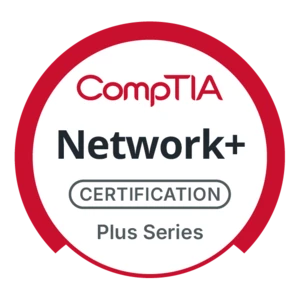Course Overview
Course Overview
CompTIA Network+, which is offered in conjunction with CounselTrain Technologies within Dubai, Abu Dhabi, and throughout all of the UAE, is a world-class certification that validates the most important network skills and concepts. This course helps you understand the basics regarding network connectivity, documenting of service configuration and cloud systems, data centers, virtual networking, monitoring, troubleshooting, and security of networks.
Network+ will prepare you for positions in technical support as well as management of systems, network operations, as well as other IT-related careers that require fundamental networking skills.
Key Features Of Network+ Certification
- Internationally recognized network certification. This certification strengthens fundamental networking concepts and tools that cover a broad range of technologies
- Provides access to careers in cybersecurity and network administration. A recommended path to take before advanced certifications, such as Security+ or CCNA
- Concentrate on practical skills for establishing and maintaining networks
Renewal options are available to extend the validity of certifications. Continuously updated exam contents to keep up with industry standards.
Skills Learned
- Set up wireless and wired devices, including IP addresses, ports, and protocols, as well as the network’s architecture and life-cycle processes, changes, and configuration management.
- Learn about cloud service models, virtualization, elasticity, and scalability performance, and address connectivity issues to ensure uptime. Secure networks and minimize security risks using the right techniques and tools.
Exam Details
Exam version 9.
Exam Series code N10-009
The date of launch is June 20th, 2024.
The number of questions of up to (multiple-choice and performance-related)
Retirement: approximately three years after the launch (expected 2027)
Time of 90 minutes. The score is 702 (on a scale of 100 to 900)
There are five languages available: English, German, Japanese, Portuguese, and Spanish. Experience recommended: CompTIA A+ with 9-12 months of actual networking experience.
NICE/DoD 8140 positions: Technical support specialist, Network operations specialist, administrator of the system
Flexible Training Options to Meet Your Needs
At CounselTrain, we understand that flexibility can improve learning outcomes. This is why our CompTIA Network+ training across Dubai, Abu Dhabi, and throughout the UAE can be found in various different learning formats to ensure that every student gets the maximum value.
Target Audience
Aspiring Network Professionals
System Administrators
Technical Enthusiasts
Small Business Owners
Helpdesk Support Staff
Network Security Analysts
CompTIA Network+ Course in the United Arab Emirates
It is the CompTIA Network+ course by CounselTrain in the UAE is essential for those who want to master network fundamentals. As companies are able to expand to Dubai, Abu Dhabi, and across the UAE are embracing advanced digital infrastructures, and the demand for network engineers with experience continues to grow.
This course will provide a comprehensive knowledge of network infrastructure as well as protocols, configurations, security techniques and troubleshooting strategies. With this Network+ certification, learners can prepare themselves for a career in finance, telecommunications, technology, healthcare, and other sectors that are in high demand.
Target Audiance
- Aspiring Network Professionals
- IT Technicians
- System Administrators
- Technical Enthusiasts
- Small Business Owners
- Helpdesk Support Staff
- Network Security Analysts
CompTIA Network+ Course in the United Arab Emirates
The CompTIA Network+ course offered by CounselTrain in the United Arab Emirates is essential for individuals aiming to excel in the dynamic field of IT networking. In the UAE, as in the rest of the world, networking plays a crucial role in various industries, from telecommunications to finance, healthcare, and beyond. With the increasing demand for skilled network professionals, obtaining CompTIA Network+ certification becomes paramount. This course equips participants with a comprehensive understanding of network architecture, protocols, security measures, and troubleshooting techniques, ensuring they are well-prepared to address the evolving needs of modern networking environments.




 4.8
4.8
